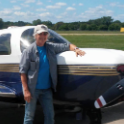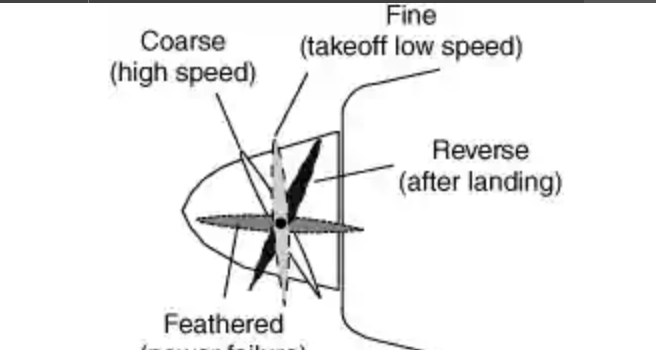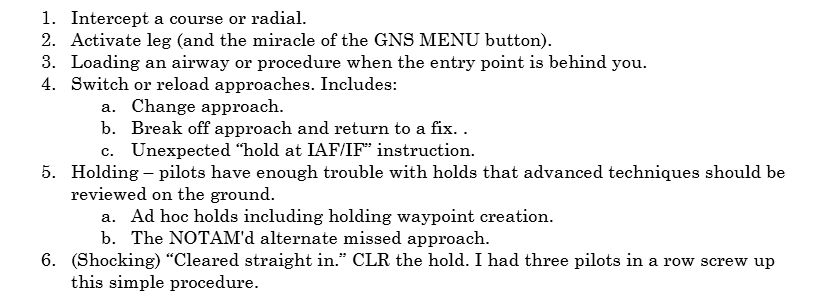-
Posts
4,091 -
Joined
-
Last visited
-
Days Won
11
Content Type
Profiles
Forums
Blogs
Gallery
Downloads
Media Demo
Events
Everything posted by midlifeflyer
-
If it helps any, I am using both ForeFlight and Pilot. In terms of a switch, most really depends how easily you take to technology differences. Overall, both apps will give you what you need and you’ll probably find 90% of the useful features are the same. The main difference is flow - how to get to what you want. In a nutshell, ForeFlight started as a flight planner with in-flight functionality. Pilot basically emulates Garmin’s GTN-family oanel mounts, including its menu system and flight plan entry (which can be a plus if you ate flying a Garmin panel). That difference in emphasis means some tasks will be easier in one the other. the only way to know if the switch is worth the savings is to grab the trial and use it.
-

Requirement for runway lights for IFR takeoff
midlifeflyer replied to Ibra's topic in General Mooney Talk
Me too. I try to always know what my alternatives are*. Fortunately, with ADS-B or XM weather, there should be very few surprises. And I will happily head somewhere else rather than exceed my personal minimums. From that standpoint, approach conditions below personal minimums is no different than a thunderstorm sitting over the airport at arrival time. (* That means more than filed alternate, which is worst-case scenario planning and pretty much irrelevant in flight.) -

Requirement for runway lights for IFR takeoff
midlifeflyer replied to Ibra's topic in General Mooney Talk
Many have personal departure mins higher than their approach mins. -

Requirement for runway lights for IFR takeoff
midlifeflyer replied to Ibra's topic in General Mooney Talk
We did? -

Requirement for runway lights for IFR takeoff
midlifeflyer replied to Ibra's topic in General Mooney Talk
There are no general part 91 rules requiring airport lighting of any kind for departures. There may be takeoff minimums requiring lighting at a specific airports and there may be requirement for certain operators, but not plain vanilla Part 91. -
That's a excellent point. For most regulations, I think much of the looseness is just poor drafting or not thinking of some of the consequences of the language, so it may well mean being more careful. But there are also those areas - offhand I think the poster child is probably the fuzzy border between Parts 91 and 135 - where I think the published regulations are intentionally susceptible to multiple interpretations because of all the new and clever ways people argue around it. I don't really expect to see a change from "if it quacks like a duck". More like the Court of Appeals' statement in the Warbird case about deference: "Because we conclude that the regulation is unambiguous and covers Warbird's conduct (Warbird does not contest the ALJs under-lying factual determinations), we need not address Warbird's remaining arguments about the FAA's interpretation of this regulation." Thinking back to Trent Palmer, deference wasn't even an issue discussed by the court (except for the penalty).
-
Agreed. You definitely know more after practice. A lot more. But it’s equally important to know the limitations of the practice (again just like circling approaches in CAVU conditions). In retrospect, my short adventure had a humorous aspect. It was a second lesson for a new student. The turnback involved flight over construction sites. The student talked about it at work. Someone asked him, “how low were you?” He answered, “the construction worker had blue eyes.”
-
It’s easy to overestimate the effect of the Relentless and Loper Bright cases (which overturned Chevron). At a baseline, neither Chevron nor these cases were about creating regulations. That process is directly authorized and controlled by the legislation governing the agency and the Administrative Procedures Act. Those regulations, unless successfully challenged claiming the agency had no authority to make them or followed improper procedures, have the force of law. The cases are about agency interpretation of the regulations properly made, and mainly say, that the courts should not automatically defer to those interpretations. “The Administrative Procedure Act requires courts to exercise their independent judgment in deciding whether an agency has acted within its statutory authority, and courts may not defer to an agency interpretation of the law simply because a statute is ambiguous.” A court making an independent judgement of the metes and bounds of an agency’s authority when reviewing a regulation or its meaning is a very different thing than “out the window.” I don’t expect to see too many cases raising that flag and expect to see the courts side with the agency in most of them.
-
I don’t recall seeing the earlier one, but I wouldn’t be surprised to see differences. For example, this uses a 360 degree turn instead of the 270/90 changes in direction which would be needed and which I’ve seen suggested practicing elsewhere. Plus, the whole concept of doing it at altitude means it’s only testing altitude loss, not distance from the “runway” and some of the other variables and sensations which go into the maneuver. I’ve seen pilots have issues with unfamiliar low-altitude maneuvering during practice circling approaches - and that’s with power. Having done a partial power loss turn back for real, I can say the view is very different and the temptation to pull back despite knowing we need to keep the nose level strong.
-
It should make a difference. Since we can’t feather, prop back (coarse pitch) is about as close as we can get to feathering. Not the best, but a decent diagram of prop position.
-
The large turn radius with a high glide speed is probably the smallest apart of the problem. Go up and practice the maneuver at altitude and you can get an idea of how much altitude you need in order to complete it and get lined up with the departure runway. The problem is that there are other variables. The winds that day will have an effect on not only whether you will make the runway but also whether you will end up overshooting it. That nice big headwind during departure translates to a non-so-nice tailwind for landing on that not-so-long runway. So testing itself is only going to give you a baseline which needs to be adjusted that day. I've seen monographs which go into some calculations but realistically, who is going to do that? The best bet, other than giving up doing it ever, is to test for that baseline, and like takeoff and landing distance calculations, or even instrument approaches, create a personal minimum that you ultimately adjust for conditions with a guestimate. For those interested, this is the testing suggested by Brian Shiff.
-

Plane crash in Fullerton California
midlifeflyer replied to Sixstring2k's topic in Mooney Safety & Accident Discussion
Which is why it's al speculation until then. -

Plane crash in Fullerton California
midlifeflyer replied to Sixstring2k's topic in Mooney Safety & Accident Discussion
There area a few airports like this where the only viable option is a road and hoping for traffic to notice you and stop. Gotta be over 20 years ago now, but I recall a story of a Cessna 152 making an emergency landing on the roof of a shopping mall in Florida. As I remember it, only minor injuries to pilot (and maybe passenger) and no damage to the roof. The two things I remember most from some excellent presentations on engine out emergencies are (1) fly the airplane under control all the way to the crash and (2) the "best" place to land may not be a "good" place to land. -
And I’ve done that type of training with turbos too. And, as an article I read years ago pointed out, high performance aerobatic airplanes do it multiple times a day. That’s not to say shock cooling is a good thing, but periodic proficiency training should have some kind of priority and may not be as bad as we think. And even if it is, take the time for power idle be part of a power reduction/cooling sequence.
-

Plane crash in Fullerton California
midlifeflyer replied to Sixstring2k's topic in Mooney Safety & Accident Discussion
The difference here - at least from the ADS-B feed and @Skates97 analysis of the aircraft position at the time of the failure - is that a turn back to runway 6 would probably have been successful. Or at least had a better chance for success than attempting a full downwind -base - final to 26. But yes, it has now become a recommended SOP to consider takeoff failure options as part of every pre-takeoff briefing, even if it’s just to remind ourselves to land within 15 degrees of straight ahead when below a target altitude that provides more options. And to train to have more than just a WAG what that target might be. I just did my CFI FIRC and it was discussed in one of the modules. -

Plane crash in Fullerton California
midlifeflyer replied to Sixstring2k's topic in Mooney Safety & Accident Discussion
We don’t know, but if towered airports are common in a pilot’s experience, “conventional pattern” would be pretty irrelevant. If @Skates97 is correct, it wasn’t really a teardrop. More of a turn to downwind and seeing the runway 20-30 degrees off. I have a picture in my mind of doing that. I once had a partial power loss after takeoff during a lesson where we did that. (Fortunately it’s almost a funny story.) -

Plane crash in Fullerton California
midlifeflyer replied to Sixstring2k's topic in Mooney Safety & Accident Discussion
Because he felt he was so close. It’s hard to resist that pavement. (assuming your speculation is accurate) -

Plane crash in Fullerton California
midlifeflyer replied to Sixstring2k's topic in Mooney Safety & Accident Discussion
Registration confirms RV-10. The RV-12 is a light sport. -

GFC-500 750XI Approach Questions
midlifeflyer replied to Speed Merchant's topic in Modern Mooney Discussion
Most instructors who teach avionics have seen most if not all of these. It's often not a matter of doing something wrong but rather rather either not knowing how to do it at all or not understanding how it applies to multiple situations. My #4 is a perfect example of the latter. I'm sure if one has received any instruments training at all with the equipment, they have completed an approach, gone missed, and loaded a different approach. The process is identical for the three sub-scenarios, including the one that began this thread. Although it's not first on the list, a fatal accident that I'm pretty sure was because of it was the reason I made the list to begin with. #6 was a big surprise because a instruction to go direct to the IF and be cleared straight in is not unusual and I think is becoming more and more common even at towered airports instead of vectors to final. It's kind of the opposite of the 1st question in this thread. The hold is there and you need to get rid of it. I pretty much do that one on every IPC as part of a fully-coupled ILS approach. The pilot either doesn't realize the hold is there (part of a much larger error-not checking the current status of the flight plan) or just doesn't know how (there are two good options and a third I don't like). But it's fun to see what the pilot does when the AP turns outbound rather than inbound for the straight in. -

GFC-500 750XI Approach Questions
midlifeflyer replied to Speed Merchant's topic in Modern Mooney Discussion
Yes. It will sequence to the missed but fortunately not follow it until you say so. -

GFC-500 750XI Approach Questions
midlifeflyer replied to Speed Merchant's topic in Modern Mooney Discussion
Right. If the hold is already loaded, all you have to do is go there. The discussion would be part of the debrief. I take notes about debrief items during flights. Here's the Six. I use at least one in flight during an IPC and will discuss at least one other on the ground because they are so common. -

GFC-500 750XI Approach Questions
midlifeflyer replied to Speed Merchant's topic in Modern Mooney Discussion
That’s one of the scenarios in my six “GPS Tasks Pilot Don’t Know How To Do.” If you are coming in on a NoPT transition, the hold in lieu will not be loaded. If you get an instruction to hold as published there, just reload the approach (6-10 seconds) with the IAF/IF as the transition. The hold will be there. Glad your CFI did it. It’s not an uncommon scenario. But why didn’t that CFI show you how? To your first question, TOGA gives you a 7 degree wings level climb to initiate the missed. But at some point, you need to tell the GFC what to do by selecting a vertical and lateral mode. Think about what would happen if it automated the missed: ATC: On the missed, fly runway heading. Climb and maintain 3,000. ATC (a few minutes later): Why are you making a 180 and stopping at 2000? -
Some manufacturers make avionics for both the certified and experimental/LSA markets. You give the example of Dynon which, after years in the E/LSA market, decided to take the steps for certified aircraft. Garmin is in both markets. I’ve flown LSA with Garmin as long ago as maybe 15 years. The G5 and the G3X were both originally created in the E/LSA market.






